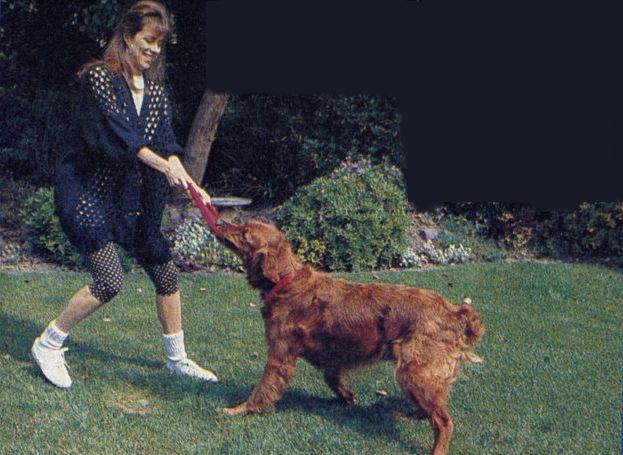By Joan Mac Trevor, CinÚ TÚlÚ Revue, 1990
|
|
Home | Cette page en Franšais |
| Life would be vain without a good cause to defend ! | |||||
|
By Joan Mac Trevor, CinÚ TÚlÚ Revue, 1990 |
|
||||
 Nancy
Grahn feels very near to Julia Wainwright, her character in the show Santa
Barbara. With Lane Davies (Mason), she formed during four years a
harmonious and ideal couple, shaken by crises and ruptures certainly, but
perfectly welded. A so perceptible unit on screen which one hastened to
associate lovingly Lane Davies and Nancy Grahn in life. But one and the other
contradict this rumour vigorously. A correction which however does not exclude a
deep friendship. Since, however, Lane Davies, tired of his character, returned
his apron. It was last June. But Mason did not die. Since the beginning of the
year, the American televiewers can find him under the features of Terry Lester,
better known of Europeans for the character of Jack Abbott in The Young
and the Restless. And what made Nancy Grahn meanwhile ? She did not take
the veil of the widows, but benefitted from this undulation to consolidate her
character and to put order in her life.
Nancy
Grahn feels very near to Julia Wainwright, her character in the show Santa
Barbara. With Lane Davies (Mason), she formed during four years a
harmonious and ideal couple, shaken by crises and ruptures certainly, but
perfectly welded. A so perceptible unit on screen which one hastened to
associate lovingly Lane Davies and Nancy Grahn in life. But one and the other
contradict this rumour vigorously. A correction which however does not exclude a
deep friendship. Since, however, Lane Davies, tired of his character, returned
his apron. It was last June. But Mason did not die. Since the beginning of the
year, the American televiewers can find him under the features of Terry Lester,
better known of Europeans for the character of Jack Abbott in The Young
and the Restless. And what made Nancy Grahn meanwhile ? She did not take
the veil of the widows, but benefitted from this undulation to consolidate her
character and to put order in her life.
Since she offered to herself, with the pay of Santa Barbara , a small house in San Fernando Valley, that she occupies with her dog Barney, Nancy Grahn is the happiest woman. She also bought a convertible BMW... to make her shopping. "During years", explains Nancy Grahn with enthusiasm, "I convinced myself that only a stable relation with a man would decide to me to buy a house. I was disabled with the idea of having to occupy of a house all alone and to pay the monthly drafts of it. Since, I radically changed of opinion. I appreciate what Santa Barbara gave me. I feel myself even better in my work, and the purchase of this house completely opened me out in my life of woman. I believe that I will still remain unmarried a long time."
During four years, Nancy Grahn shared the life of Sam Behrens, one of the protagonists of General Hospital. But she takes care well, today, not to recommend this kind of relation. "The majority of my relations in love, it was with actors. All failures. The actors are generally full of charm, tempting, but unable to remain in place. They are always persuaded that there is better to discover behind the corner and would feel frustrated to be private of it." What does not prevent Nancy Grahn from regularly coming out with a television producer... "A producer, but not an actor ", she corrects without resentment. "I had relationships with "civil ones", as she calls people who do not belong to the show business, but they were in general unable to live with a celebrity of the show business. I felt them frightened by the trade that I made. An uncomfortable impression !"
In nine months, Nancy Grahn had time to get used to the absence of Lane Davies, but she always regretted the departure of the actor who had become her friend and her confidant. Of an optimistic naturalness, Nancy wants however to see only the good side of the things and accomodate with enthusiasm the new Mason. "Lane was a more mysterious Mason, darker, more tragic. Terry is funnier, less secret, more accessible. They do not resemble each other. Moreover, Terry's mason is more loving. A heat which missed my character. I like to play with Terry, almost as much as with Lane, until he wearies of the role. After, everything worsened. He made a wise decision while leaving. But the European televiewer still has a few years before to see that, because Lane is an exceptional actor and he knew to make of Mason a pivot character in Santa Barbara ."
 When
I say to her how much the European public is disturbed by the frequent changes
of actors within the American shows, Nancy philosophically sweeps the objection
of large act of hand. "Any change is disconcerting and requires a period of
adaptation. What does we do in life if not to adapt permanently to new
situations ? Once the character played and the new actor adopted, this small
frustration, as I knew it myself with Lane, is forgotten.
When
I say to her how much the European public is disturbed by the frequent changes
of actors within the American shows, Nancy philosophically sweeps the objection
of large act of hand. "Any change is disconcerting and requires a period of
adaptation. What does we do in life if not to adapt permanently to new
situations ? Once the character played and the new actor adopted, this small
frustration, as I knew it myself with Lane, is forgotten.
Santa Barbara however offers a paradox which remains for Nancy Grahn, in spite of her great adaptability, a perpetual matter of astonishment : how to explain, indeed, that the show gains many rewards, while occupying a relatively modest place in the statements of audience in the United States ? "I see only two explanations", she advances, hesitant. "The televiewers remain faithful to the old soaps like General Hospital and Guiding Light and, by fidelity or habituation, do not wish to connect on a more recent show like Santa Barbara . It is a form of conservatism. That is to say the surveys do not take account of whole sections of populations. I am sure, for example, that the many schoolboys who look at us are not included in the surveys." Nancy Grahn assumes the responsibility of her explanations. But the attempt to rehabilitate Santa Barbara according to the Americans is meritorious. It translates the enthusiasm of Nancy for her work and the interest she carries to her character.
When she does not work, Nancy Grahn can taste the calm of her country house. The place she appreciates over all, is her bedroom and the softness of her bed surmounted by four amounts of wood. She can spend there hours, a book of philosophy (her passion !) in the hand. The return to oneself is however not the speciality of Nancy Grahn. Because, as soon as arises a good cause to defend, she is on the barricades. For the abortion, against the alcoholism and drug, for the environmental protection, more consideration to the handicapped people. "My life would be vain without a cause to defend or a new combat to be delivered. The humans rights are very at the honor today. Even in Russia and East Germany. It is only justice after one decade of blind materialism and a half-century of untrue ideologies. It is not a chance if the man who makes vibrate crowd today is not Ronald Reagan but Nelson Mandela."
In this perfectly balanced life, Nancy Grahn preserved a major property : her independence. Unlike many stars of soap-operas, grayed by their sudden fortune and who show more cicadas than ants, Nancy-the-wise did not launch out in excessive expenditures. Her house is modest and her car is her only luxury. Thus can she reserve the right to say constantly "no" to the show, when she will have one day the desire to discover other professional horizons.